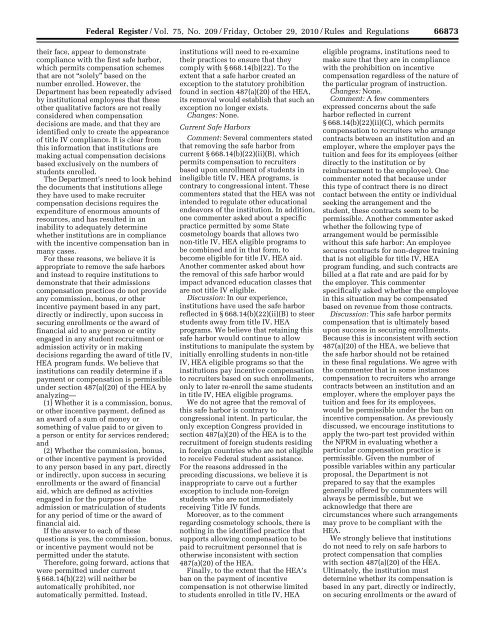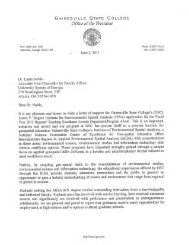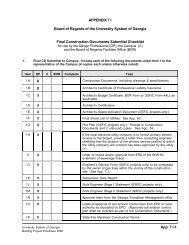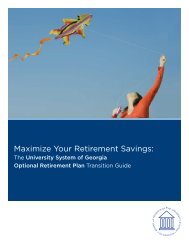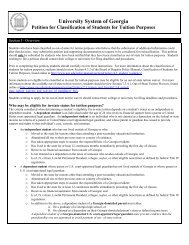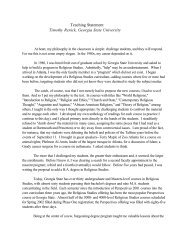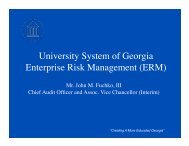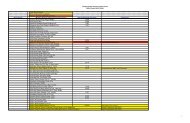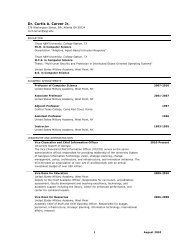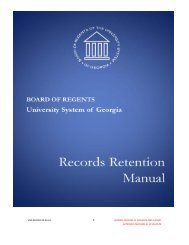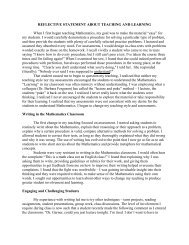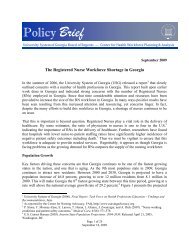66872 Federal Register / Vol. 75, No. 209 / Friday, October 29, 2010 / Rules and RegulationsWReier-Aviles on DSKGBLS3C1PROD with RULES2students to take coursework at anotherinstitution or whether they apply toinstitutions that enter into arrangementswhen students choose to takecoursework at another institution. Thecommenters stated that if thenotifications apply to both situations,the regulations would create anoverwhelming burden for institutions.These commenters expressed concernthat this burden would result ininstitutions limiting the use <strong>of</strong> writtenarrangements and that this, in turn,would result in less choice for students.Discussion: We appreciate the supportfor requiring additional disclosuresregarding the portion <strong>of</strong> a program beingprovided by a different institution andthe additional costs that a student mayincur under such an arrangement. Weagree that these disclosures should beclear and understandable. While weagree that providing the Web site <strong>of</strong> thenon-degree-granting institution in thedisclosures may be helpful to students,on balance, we determined thatrequiring that particular disclosure isnot necessary and that the decision toinclude such information in thedisclosure should be left to the degreegrantinginstitution’s discretion.As noted by the commenters, therequired disclosures include disclosure<strong>of</strong> the estimated additional costsstudents may incur as the result <strong>of</strong>enrolling in an educational program thatis provided, in part, under a writtenarrangement. Therefore, when thecoursework provided through thewritten arrangement is provided online,it would be appropriate to includeestimated additional costs such as thecosts <strong>of</strong> purchasing a computer andobtaining Internet access.As stated in the preamble to theNPRM, the disclosure requirementsreflected in §§ 668.5(e) and668.43(a)(12) apply to writtenarrangements between or amonginstitutions under which the degreegrantinginstitution can <strong>of</strong>fereducational programs that are provided,in part, by another institution (i.e., on aneducational program-by-program basis)and not to individual, student-initiatedwritten arrangements. Weacknowledged that requiring disclosuresto individual, student-initiated writtenarrangements would be impractical,burdensome and unnecessary becausethe student is a party to the arrangementand would already have the informationrequired to be disclosed.Changes: None.Incentive Compensation (§ 668.14(b))GeneralComment: A significant number <strong>of</strong>commenters supported the Secretary’sproposed changes to § 668.14(b)(22),which they stated would align theregulations with the statute andcomprehensively ban the use <strong>of</strong>commissions, bonuses, and other directforms <strong>of</strong> compensation based on successin securing enrollments or the award <strong>of</strong>financial aid. These commenterssupported our efforts to ensure theintegrity <strong>of</strong> the Federal student aidprograms and to protect students againstaggressive admissions and recruitmentpractices. They agreed that the currentregulations, which included thelanguage describing permittedcompensation activities (i.e., ‘‘safeharbors’’), did not achieve the goalsintended by the Congress. Thesecommenters expressed the belief thatthe current safe harbors enableinstitutions to circumvent the law.Several commenters stated that theproposed definitions reflected in§ 668.14(b)(22)(iii) would be particularlyhelpful and expressed appreciation forour readiness to provide broad andappropriate guidance to institutions,rather than opinions on an individualinstitution’s arrangements, in evaluatingcompensation issues.Numerous commenters, particularlygroups representing admissionscounselors, specifically supported thedeletion <strong>of</strong> the twelve safe harbors. Thegroups representing admissionscounselors stated that they believe thatcounselors should be compensated inthe form <strong>of</strong> a fixed salary. They furtherargued that because the admissionspr<strong>of</strong>ession is a form <strong>of</strong> counseling,admissions pr<strong>of</strong>essionals can onlydischarge their ethical obligations ifthey are free <strong>of</strong> vested interests in theenrollment decisions made by theprospective students they advise. Thecommenters representing admissionspersonnel also noted that elimination <strong>of</strong>the safe harbors would help prevent arecruiter’s financial interest fromoverriding a student’s academic interest.Discussion: The Secretary appreciatesthe support <strong>of</strong>fered by the commenters.Changes: None.Comment: A number <strong>of</strong> commenterswho expressed support for theSecretary’s goal in proposing changes to§ 668.14(b)(22) requested modificationsto the regulatory language or to thepreamble discussion. The majority <strong>of</strong>these commenters requestedclarifications to assist institutions inunderstanding whether particularcompensation activities would beVerDate Mar2010 14:10 Oct 28, 2010 Jkt 223001 PO 00000 Frm 00042 Fmt 4701 Sfmt 4700 E:\FR\FM\29OCR2.SGM 29OCR2prohibited under proposed§ 668.14(b)(22).Many commenters opposed theproposed changes and appealed for the<strong>Department</strong> to retain the current safeharbors. They challenged the legaladequacy <strong>of</strong> the changes and assertedthat the need for the proposed changesremained unsupported by any evidenceor data. Some commenters alleged thatthe <strong>Department</strong> had failed to specifysound reasons for the change in policyand instead had <strong>of</strong>fered nonspecificreferences to its reviews <strong>of</strong>compensation practices andexpenditures <strong>of</strong> resources.Other commenters asked whether allpayments permitted under the currentsafe harbors would be prohibited underthis new regulatory framework.Discussion: Under section 410 <strong>of</strong> theGeneral <strong>Education</strong> Provisions Act (20U.S.C. 1221e–3), the Secretary has theauthority to make, promulgate, issue,rescind, and amend rules andregulations governing the manner <strong>of</strong>operation <strong>of</strong>, and governing applicableprograms administered by, the<strong>Department</strong>. For regulations governingthe title IV, HEA programs, theSecretary also must ensure that thedevelopment and issuance <strong>of</strong> thoseregulations comply with the negotiatedrulemaking requirements in section 492<strong>of</strong> the HEA. In 2002, the <strong>Department</strong>adopted the incentive compensationsafe harbors reflected in current§ 668.14(b)(22)(ii) under the statutoryauthority granted in GEPA and thenegotiated rulemaking requirements inthe HEA. The <strong>Department</strong> adopted thecurrent safe harbors based on a‘‘purposive reading <strong>of</strong> section 487(a)(20)<strong>of</strong> the HEA.’’ (67 FR 51723 (August 8,2002).) Since that time, however, the<strong>Department</strong>’s experience hasdemonstrated that unscrupulous actorsroutinely rely upon these safe harbors tocircumvent the intent <strong>of</strong> section487(a)(20) <strong>of</strong> the HEA. As such, ratherthan serving to effectuate the goalsintended by Congress through itsadoption <strong>of</strong> section 487(a)(20) <strong>of</strong> theHEA, the safe harbors have served toobstruct those objectives and havehampered the <strong>Department</strong>’s ability toefficiently and effectively administer thetitle IV, HEA programs.For example, it has been the<strong>Department</strong>’s experience that manyinstitutions routinely use employeeevaluation forms that acknowledge thatthe number <strong>of</strong> students enrolled is animportant, if not the most important,variable, in determining recruitercompensation. These forms also listcertain qualitative factors that areostensibly considered in makingcompensation decisions. The forms, on
Federal Register / Vol. 75, No. 209 / Friday, October 29, 2010 / Rules and Regulations66873WReier-Aviles on DSKGBLS3C1PROD with RULES2their face, appear to demonstratecompliance with the first safe harbor,which permits compensation schemesthat are not ‘‘solely’’ based on thenumber enrolled. However, the<strong>Department</strong> has been repeatedly advisedby institutional employees that theseother qualitative factors are not reallyconsidered when compensationdecisions are made, and that they areidentified only to create the appearance<strong>of</strong> title IV compliance. It is clear fromthis information that institutions aremaking actual compensation decisionsbased exclusively on the numbers <strong>of</strong>students enrolled.The <strong>Department</strong>’s need to look behindthe documents that institutions allegethey have used to make recruitercompensation decisions requires theexpenditure <strong>of</strong> enormous amounts <strong>of</strong>resources, and has resulted in aninability to adequately determinewhether institutions are in compliancewith the incentive compensation ban inmany cases.For these reasons, we believe it isappropriate to remove the safe harborsand instead to require institutions todemonstrate that their admissionscompensation practices do not provideany commission, bonus, or otherincentive payment based in any part,directly or indirectly, upon success insecuring enrollments or the award <strong>of</strong>financial aid to any person or entityengaged in any student recruitment oradmission activity or in makingdecisions regarding the award <strong>of</strong> title IV,HEA program funds. We believe thatinstitutions can readily determine if apayment or compensation is permissibleunder section 487(a)(20) <strong>of</strong> the HEA byanalyzing—(1) Whether it is a commission, bonus,or other incentive payment, defined asan award <strong>of</strong> a sum <strong>of</strong> money orsomething <strong>of</strong> value paid to or given toa person or entity for services rendered;and(2) Whether the commission, bonus,or other incentive payment is providedto any person based in any part, directlyor indirectly, upon success in securingenrollments or the award <strong>of</strong> financialaid, which are defined as activitiesengaged in for the purpose <strong>of</strong> theadmission or matriculation <strong>of</strong> studentsfor any period <strong>of</strong> time or the award <strong>of</strong>financial aid.If the answer to each <strong>of</strong> thesequestions is yes, the commission, bonus,or incentive payment would not bepermitted under the statute.Therefore, going forward, actions thatwere permitted under current§ 668.14(b)(22) will neither beautomatically prohibited, norautomatically permitted. Instead,institutions will need to re-examinetheir practices to ensure that theycomply with § 668.14(b)(22). To theextent that a safe harbor created anexception to the statutory prohibitionfound in section 487(a)(20) <strong>of</strong> the HEA,its removal would establish that such anexception no longer exists.Changes: None.Current Safe HarborsComment: Several commenters statedthat removing the safe harbor fromcurrent § 668.14(b)(22)(ii)(B), whichpermits compensation to recruitersbased upon enrollment <strong>of</strong> students inineligible title IV, HEA programs, iscontrary to congressional intent. Thesecommenters stated that the HEA was notintended to regulate other educationalendeavors <strong>of</strong> the institution. In addition,one commenter asked about a specificpractice permitted by some Statecosmetology boards that allows twonon-title IV, HEA eligible programs tobe combined and in that form, tobecome eligible for title IV, HEA aid.Another commenter asked about howthe removal <strong>of</strong> this safe harbor wouldimpact advanced education classes thatare not title IV eligible.Discussion: In our experience,institutions have used the safe harborreflected in § 668.14(b)(22)(ii)(B) to steerstudents away from title IV, HEAprograms. We believe that retaining thissafe harbor would continue to allowinstitutions to manipulate the system byinitially enrolling students in non-titleIV, HEA eligible programs so that theinstitutions pay incentive compensationto recruiters based on such enrollments,only to later re-enroll the same studentsin title IV, HEA eligible programs.We do not agree that the removal <strong>of</strong>this safe harbor is contrary tocongressional intent. In particular, theonly exception Congress provided insection 487(a)(20) <strong>of</strong> the HEA is to therecruitment <strong>of</strong> foreign students residingin foreign countries who are not eligibleto receive Federal student assistance.For the reasons addressed in thepreceding discussions, we believe it isinappropriate to carve out a furtherexception to include non-foreignstudents who are not immediatelyreceiving Title IV funds.Moreover, as to the commentregarding cosmetology schools, there isnothing in the identified practice thatsupports allowing compensation to bepaid to recruitment personnel that isotherwise inconsistent with section487(a)(20) <strong>of</strong> the HEA.Finally, to the extent that the HEA’sban on the payment <strong>of</strong> incentivecompensation is not otherwise limitedto students enrolled in title IV, HEAVerDate Mar2010 14:10 Oct 28, 2010 Jkt 223001 PO 00000 Frm 00043 Fmt 4701 Sfmt 4700 E:\FR\FM\29OCR2.SGM 29OCR2eligible programs, institutions need tomake sure that they are in compliancewith the prohibition on incentivecompensation regardless <strong>of</strong> the nature <strong>of</strong>the particular program <strong>of</strong> instruction.Changes: None.Comment: A few commentersexpressed concerns about the safeharbor reflected in current§ 668.14(b)(22)(ii)(C), which permitscompensation to recruiters who arrangecontracts between an institution and anemployer, where the employer pays thetuition and fees for its employees (eitherdirectly to the institution or byreimbursement to the employee). Onecommenter noted that because underthis type <strong>of</strong> contract there is no directcontact between the entity or individualseeking the arrangement and thestudent, these contracts seem to bepermissible. Another commenter askedwhether the following type <strong>of</strong>arrangement would be permissiblewithout this safe harbor: An employeesecures contracts for non-degree trainingthat is not eligible for title IV, HEAprogram funding, and such contracts arebilled at a flat rate and are paid for bythe employer. This commenterspecifically asked whether the employeein this situation may be compensatedbased on revenue from those contracts.Discussion: This safe harbor permitscompensation that is ultimately basedupon success in securing enrollments.Because this is inconsistent with section487(a)(20) <strong>of</strong> the HEA, we believe thatthe safe harbor should not be retainedin these final regulations. We agree withthe commenter that in some instancescompensation to recruiters who arrangecontracts between an institution and anemployer, where the employer pays thetuition and fees for its employees,would be permissible under the ban onincentive compensation. As previouslydiscussed, we encourage institutions toapply the two-part test provided withinthe NPRM in evaluating whether aparticular compensation practice ispermissible. Given the number <strong>of</strong>possible variables within any particularproposal, the <strong>Department</strong> is notprepared to say that the examplesgenerally <strong>of</strong>fered by commenters willalways be permissible, but weacknowledge that there arecircumstances where such arrangementsmay prove to be compliant with theHEA.We strongly believe that institutionsdo not need to rely on safe harbors toprotect compensation that complieswith section 487(a)(20) <strong>of</strong> the HEA.Ultimately, the institution mustdetermine whether its compensation isbased in any part, directly or indirectly,on securing enrollments or the award <strong>of</strong>
- Page 1 and 2: Friday,October 29, 2010Part IIDepar
- Page 3 and 4: Federal Register / Vol. 75, No. 209
- Page 6 and 7: 66836 Federal Register / Vol. 75, N
- Page 8 and 9: 66838 Federal Register / Vol. 75, N
- Page 10 and 11: WReier-Aviles on DSKGBLS3C1PROD wit
- Page 12 and 13: 66842 Federal Register / Vol. 75, N
- Page 14 and 15: 66844 Federal Register / Vol. 75, N
- Page 16 and 17: WReier-Aviles on DSKGBLS3C1PROD wit
- Page 18 and 19: 66848 Federal Register / Vol. 75, N
- Page 20 and 21: 66850 Federal Register / Vol. 75, N
- Page 22 and 23: WReier-Aviles on DSKGBLS3C1PROD wit
- Page 24 and 25: 66854 Federal Register / Vol. 75, N
- Page 26 and 27: WReier-Aviles on DSKGBLS3C1PROD wit
- Page 28 and 29: 66858 Federal Register / Vol. 75, N
- Page 30 and 31: 66860 Federal Register / Vol. 75, N
- Page 32 and 33: 66862 Federal Register / Vol. 75, N
- Page 34 and 35: 66864 Federal Register / Vol. 75, N
- Page 36 and 37: 66866 Federal Register / Vol. 75, N
- Page 38 and 39: WReier-Aviles on DSKGBLS3C1PROD wit
- Page 40 and 41: WReier-Aviles on DSKGBLS3C1PROD wit
- Page 44 and 45: WReier-Aviles on DSKGBLS3C1PROD wit
- Page 46 and 47: WReier-Aviles on DSKGBLS3C1PROD wit
- Page 48 and 49: WReier-Aviles on DSKGBLS3C1PROD wit
- Page 50 and 51: 66880 Federal Register / Vol. 75, N
- Page 52 and 53: WReier-Aviles on DSKGBLS3C1PROD wit
- Page 54 and 55: 66884 Federal Register / Vol. 75, N
- Page 56 and 57: 66886 Federal Register / Vol. 75, N
- Page 58 and 59: WReier-Aviles on DSKGBLS3C1PROD wit
- Page 60 and 61: WReier-Aviles on DSKGBLS3C1PROD wit
- Page 62 and 63: WReier-Aviles on DSKGBLS3C1PROD wit
- Page 64 and 65: WReier-Aviles on DSKGBLS3C1PROD wit
- Page 66 and 67: WReier-Aviles on DSKGBLS3C1PROD wit
- Page 68 and 69: WReier-Aviles on DSKGBLS3C1PROD wit
- Page 70 and 71: WReier-Aviles on DSKGBLS3C1PROD wit
- Page 72 and 73: 66902 Federal Register / Vol. 75, N
- Page 74 and 75: WReier-Aviles on DSKGBLS3C1PROD wit
- Page 76 and 77: WReier-Aviles on DSKGBLS3C1PROD wit
- Page 78 and 79: 66908 Federal Register / Vol. 75, N
- Page 80 and 81: WReier-Aviles on DSKGBLS3C1PROD wit
- Page 82 and 83: 66912 Federal Register / Vol. 75, N
- Page 84 and 85: WReier-Aviles on DSKGBLS3C1PROD wit
- Page 86 and 87: 66916 Federal Register / Vol. 75, N
- Page 88 and 89: WReier-Aviles on DSKGBLS3C1PROD wit
- Page 90 and 91: WReier-Aviles on DSKGBLS3C1PROD wit
- Page 92 and 93:
WReier-Aviles on DSKGBLS3C1PROD wit
- Page 94 and 95:
66924 Federal Register / Vol. 75, N
- Page 96 and 97:
WReier-Aviles on DSKGBLS3C1PROD wit
- Page 98 and 99:
66928 Federal Register / Vol. 75, N
- Page 100 and 101:
WReier-Aviles on DSKGBLS3C1PROD wit
- Page 102 and 103:
66932 Federal Register / Vol. 75, N
- Page 104 and 105:
WReier-Aviles on DSKGBLS3C1PROD wit
- Page 106 and 107:
66936 Federal Register / Vol. 75, N
- Page 108 and 109:
66938 Federal Register / Vol. 75, N
- Page 110 and 111:
66940 Federal Register / Vol. 75, N
- Page 112 and 113:
66942 Federal Register / Vol. 75, N
- Page 114 and 115:
66944 Federal Register / Vol. 75, N
- Page 116 and 117:
66946 Federal Register / Vol. 75, N
- Page 118 and 119:
WReier-Aviles on DSKGBLS3C1PROD wit
- Page 120 and 121:
WReier-Aviles on DSKGBLS3C1PROD wit
- Page 122 and 123:
WReier-Aviles on DSKGBLS3C1PROD wit
- Page 124 and 125:
66954 Federal Register / Vol. 75, N
- Page 126 and 127:
WReier-Aviles on DSKGBLS3C1PROD wit
- Page 128 and 129:
66958 Federal Register / Vol. 75, N
- Page 130 and 131:
66960 Federal Register / Vol. 75, N
- Page 132 and 133:
WReier-Aviles on DSKGBLS3C1PROD wit
- Page 134 and 135:
WReier-Aviles on DSKGBLS3C1PROD wit
- Page 136 and 137:
WReier-Aviles on DSKGBLS3C1PROD wit
- Page 138 and 139:
66968 Federal Register / Vol. 75, N
- Page 140 and 141:
66970 Federal Register / Vol. 75, N
- Page 142 and 143:
66972 Federal Register / Vol. 75, N
- Page 144 and 145:
66974 Federal Register / Vol. 75, N


